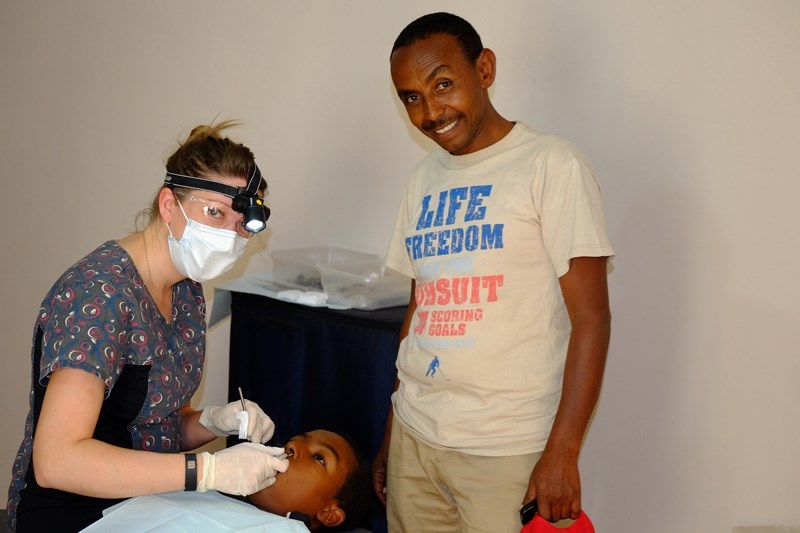A local couple who travelled to Ethiopia last month to provide dental care for children are extremely touched by the gratitude of those kids and their guardians.
Jared Ord, a dentist, and his wife Lindsay, a dental hygienist, made that trip in mid-February. Over a 16-day period, they and other team members provided dental services for about 230 people, roughly 210 of whom were children. The rest were guardians of those kids.
Those children were a tough bunch.
“A lot of these kids, they sit down, you ask them ‘what's wrong' and they say, ‘nothing.' You look in their mouths and there would be rotted teeth, abscesses, things that are obviously painful,” Jared said during an interview with the Gazette.
“But for them, that was normal; they just learned to live with that. So we would pull the worst teeth and plan out fixing the teeth that could be fixed later.
“They weren't very super happy initially with being frozen. This was a new experience for them. For a lot of them, we would see them a few days later – a week later – and they come running up to you, throw their arms around you, give you a hug and say thank you (in their language).
“In the case of the children's guardians, because they were adults and had lived longer, their medical and their dental conditions were “more complicated and definitely poorer.
“We were glad to do it, because these are the guardians of these kids and if they're not well and they're not able to help these kids then the program (to help them) won't succeed,” he said.
“For some of these kids after you've pulled their teeth and they're out of pain, they realize ‘I don't have to be in pain. I feel better.' And that's when they would come and give us big hugs and you realize, oh, they are our friends,” he added with a laugh.
“They do appreciate (what we did for them). They don't look at you sideways and wonder ‘what did this guy do to me?'
Jared said they visited the homes of some of the children and/or guardians for whom they had provided dental care.
“They were extremely gracious and proud to have us in their homes,” he said. “Even though they didn't really have anything to give us other than their hospitality and thanks, we felt really honoured and appreciative of their gratitude. That's I think what really helped make it all worth it.”
Lindsay said one of the situations that affected her the most was when they met a mother and father who were both completely blind.
“Their only source of income is dad begging on the street. So they're in very dire condition,” she said. “Their home was probably a six-foot by six-foot dung hut with a corrugated metal roof. And so they're in rough shape.
“But when asked if there was anything that they needed, their response was, ‘please bring more children into the program because there are so many people who are in more need than we are.'”
Unfortunately, they weren't able to travel to one area because of an uprising.
“It was really worth it, even though there were some scary moments and frustrating moments,” she said. “Seeing those kids made it worth it, and we would definitely like to go back some day when it's safer.”
When interviewed, the Ords were still getting used to being back home.
“It was an 18-hour flight from Addis Ababa to Toronto and another four hours after that, so the jet lag was pretty bad,” Jared said. “I think we're still processing everything, the culture shock. I'm still kind of reeling a bit.”
Lindsay said the entire experience has given them a new appreciation for what they have.
“Our poor children; they started fighting the day we got home and I said, ‘stop fighting. There are kids living in a junk pile in Africa who have no food to eat or get to eat once a day. You stop fighting over the remote control.'
“So our poor kids are going to hear that a lot. ‘Don't complain about this or that' because they don't know how good they have it.”
"It was really worth it, even though there were some scary moments and frustrating moments," Lindsay said. "Seeing those kids made it worth it, and we would definitely like to go back some day when it's safer."



